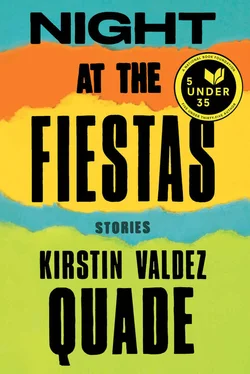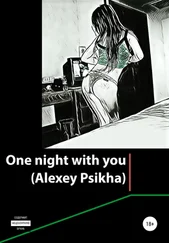I wondered who had walked in first on that brutality? Surely someone I knew, someone I passed at church or outside the post office. Maybe someone in my family. Maybe Paulita. “What about Nemecia’s father?”
“He was there on his knees, crying over Benigna. ‘I love you, I love you, I love you,’ he kept saying.”
How had it never occurred to me that, at five years old, Nemecia would have been too small to attack a grown man and woman all at once? How could I have been so stupid?
“It was terrible for your mother, you know. That day she lost her father, and she lost her sister, too. Oh, how those girls loved each other.” Paulita laughed without mirth. “But Benigna won’t be back. She barely even writes.”
If my mother didn’t fear Nemecia, then the love she showed my cousin was just that: love. Love for her sister, love for her father, love for a child terrified and abandoned, love for an entire life lost to my mother forever. It was even possible that amid all that loss, caring for Nemecia was what had saved my mother. And there was absolutely nothing — no recitation, no feat of strength — I could do to shift that.
At school I watched from across the yard for signs of what Paulita had told me, but Nemecia was the same: graceful, laughing, distant. I felt humiliated for believing her, and I resented the demands she made on my sympathy. Pity and hatred and guilt nearly choked me. If anything, I hated my cousin more, she who had once been a terrified child, she who could call that tragedy her own. Nemecia would always have the best of everything.
NEMECIA LEFT FOR CALIFORNIA three months after Corpus Christi. In Los Angeles, Aunt Benigna bought secondhand furniture and turned the small sewing room into a bedroom. She introduced Nemecia to her husband and to the miracle child. There was a palm tree in the front yard and a pink-painted gravel walkway. I know this from a letter my cousin sent my mother, signed with a flourish, Norma .
I moved back to my mother’s house and to the room that was all mine. My mother stood in the middle of the floor as I unpacked my things into the now-empty bureau. She looked lost.
“We missed you,” she said, looking out the window. And then, “It’s not right for a child to be away from her parents. It’s not right that you left us.”
I wanted to tell her that I had not left, that I had been left, led away and dropped at Paulita’s door.
“Listen.” Then she stopped and shook her head. “Ah, well,” she said, with an intake of breath.
I placed my camisoles in the drawer, one on top of the other. I didn’t look at my mother. The reconciliation and tears and embraces that I’d dreamt about didn’t come, so I hardened myself against her.
OUR FAMILY QUICKLY GREW over the space Nemecia left, so quickly that I often wondered if she’d meant anything to us at all.
Nemecia’s life became glamorous in my mind — beautiful, tragic, the story of an orphan. I imagined that I could take that life for myself. Night after night I told myself the story: a prettier me, swept away to California, and the boy who would find me and save me from my unhappiness. Cuipas slept among the vast, whispering grasses, coyotes called in the distance, and Nemecia’s story set my body alight.
We attended Nemecia’s wedding, my family and I. We took the long trip across New Mexico and Arizona to Los Angeles, me in the backseat between my brothers. For years I’d pictured Nemecia living a magazine shoot, running on the beach, stretched on a chaise longue beside a flat, blue pool. As we crossed the Mojave Desert, though, I began to get nervous — that I wouldn’t recognize her, that she’d have forgotten me. I found myself hoping that her life wasn’t as beautiful as I’d imagined it, that she’d finally been punished.
When we drove up to the little house, Nemecia ran outside in bare feet and hugged each of us as we unfolded ourselves from the car.
“Maria!” she cried, smiling, and kissed both my cheeks, and I fell into a shyness I couldn’t shake all that week.
“Nemecia, hijita,” my mother said. She stepped back and looked at my cousin happily.
“Norma,” my cousin said. “My name is Norma.”
It was remarkable how completely she’d changed. Her hair was blond now, her skin tanned dark and even.
My mother nodded slowly and repeated, “Norma.”
The wedding was the most beautiful thing I’d ever seen, and I was wrung with jealousy. I must have understood then that I wouldn’t have a wedding of my own. Like everything else in Los Angeles, the church was large and modern. The pews were pale and sleek, and the empty crucifix shone. Nemecia confessed to me that she didn’t know the priest here, that she rarely even went to church anymore. In a few years, I too would stop going, but it shocked me then to hear my cousin say it.
They didn’t speak Spanish in my aunt’s house. When my mother or father said something in Spanish, my aunt or cousin answered resolutely in English. I was embarrassed by my parents that week, the way their awkward English made them seem confused and childish.
The day before the wedding, Nemecia invited me to the beach with her girlfriend. I said I couldn’t go — I was fifteen, younger than they were, and I didn’t have a swimming suit.
“Of course you’ll come. You’re my little sister.” Nemecia opened a messy drawer and tossed me a tangled blue suit. I remember I changed in her bedroom, turned in the full-length mirror, stretched across her pink satin bed and posed like a pinup. I felt older, sensual. There, in Nemecia’s bedroom, I liked the image of myself in that swimming suit, but on the beach my courage left me. Someone took our picture, standing with a tanned, smiling man. I still have the picture. Nemecia and her friend look easy in their suits, arms draped around the man’s neck. The man — who is he? How did he come to be in the photograph? — has his arm around Nemecia’s small waist. I am beside her, hand on her shoulder, but standing as though I’m afraid to touch her. She leans into the man and away from me, her smile broad and white. I smile with my lips closed, and my other arm is folded in front of my chest. My scar shows as a gray smear on my cheek.
WHEN SHE LEFT FOR LOS ANGELES, Nemecia didn’t take the doll that sat on the bureau. The doll came with us when we moved to Albuquerque; we saved it, I suppose, for Nemecia’s children, though we never said so out loud. Later, after my mother died in 1981, I brought it from her house, where for years my mother had kept it on her own bureau. For five days it lay on the table in my apartment before I called Nemecia and asked if she wanted it back.
“I don’t know what you’re talking about,” she said. “I never had a doll.”
“The cracked one, remember?” My voice went high with disbelief. It seemed impossible that she could have forgotten. It had sat in our room for years, facing us in our beds each night as we fell asleep. A flare of anger ignited — she was lying, she had to be lying — then died.
I touched the yellowed hem of the doll’s dress, while Nemecia told me about the cruise she and her husband were taking through the Panama Canal. “Ten days,” she said, “and then we’re going to stay for three days in Puerto Rico. It’s a new boat, with casinos and pools and ballrooms. I hear they treat you royally.” While she talked, I ran my finger along the ridge of the cracks in the doll’s head. From the sound of her voice, I could almost imagine she’d never aged, and it seemed to me I’d spent my whole life listening to Nemecia’s stories.
“So what about the doll?” I asked when it was almost time to hang up. “Do you want me to send it?”
“I can’t even picture it,” she said and laughed. “Do whatever you want. I don’t need old things lying around the house.”
Читать дальше












